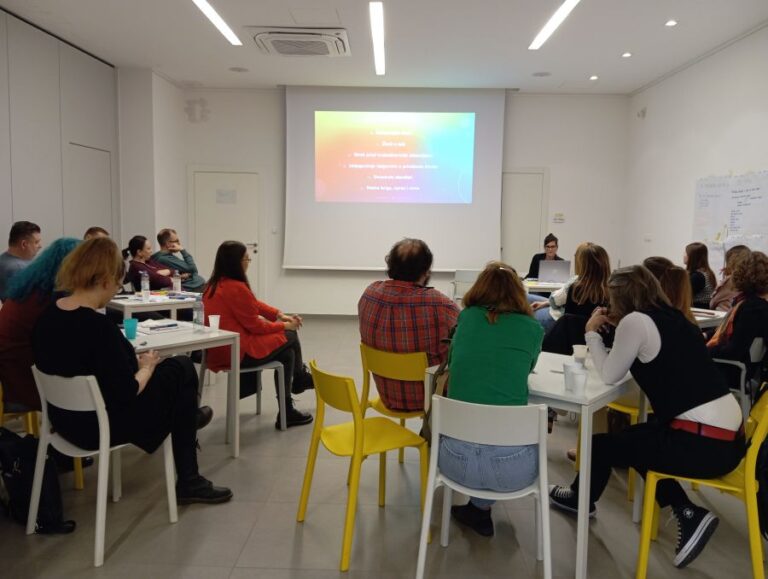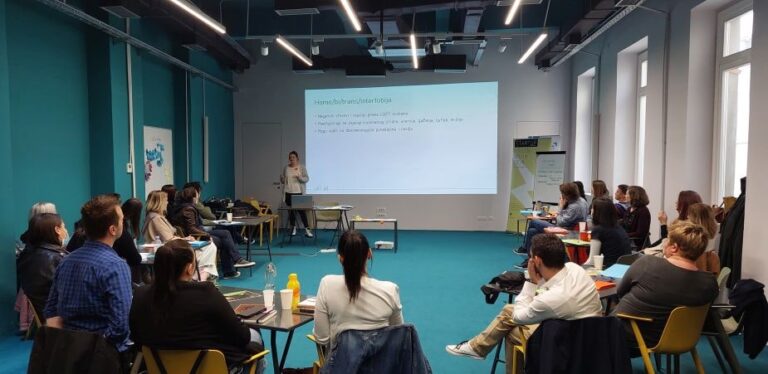How about we learn what our rights are? And then, when those rights are violated or not fulfilled, we know the procedure and who to complain to. Because at the end of the day – we are the ones paying them.
(Lesbian, cisgender woman)
It would be good if both we as a society as well as the health-care system step back from the idea that fertility is the most important thing regarding our bodies. Because like, we all talk about gynaecologists but the only sex that's important to them is the one that can result in pregnancy.
(Lesbian, transgender woman)
The study „From the margins to the focus - health-care for lesbians, bisexual, transgender and queer women“ that was conducted during 2024 by authors dr.sc. Marina Štambuk and Lesbian organisation Rijeka – LORI. It consists of two parts: 1. review of existing research and documents regarding the topic of health of LBTQ women (and LGBTIQ persons) and 2. qualitative study using focus groups with LBTQ women in Croatia.

Overall idea was that this study represents a step towards better understanding health needs of lesbians, bisexual, transgender and queer women and to contribute to combatting discrimination and developing equality and justice in health-care for this vulnerable group.
Review of existing research and documents regarding the topic of health of LBTQ women (and LGBTIQ persons)
This part of the study shows that the topic of LGBTIQ persons health in Croatia between 2000 and 2023 was mostly researched in master thesis works, research reports conducted by civil society organisations and as part of project activities by international organisations and less in research articles. The most common themes were regarding mental health and wellbeing as well as topics connected to violence and discrimination..
The so far noted experiences of LGBTIQ persons using health-care services in Croatia show the existence of structural and interpersonal boundaries such as heteronormativity of the system or experienced discrimination, along with fear of rejection as well as negative consequences for treatment and medical care being present among LGBTIQ persons. This often leads to reliance on non-institutional programmes (such as programmes of civil society organisations). TIGV persons (trans and gender variant persons) face limited access to specialized health-care and unjustifiably long and complicated procedures for filling out requirements for gender marker changes in official documents.
Health status, experiences and needs of LBTQ women in Croatia: a qualitative study
20 lesbians, bisexual, trans and queer women (eight from Rijeka, seven from Zagreb and five from Osijek) took part in a qualitative study researching their health status, experiences and health needs. Results suggest needed changes to the health-care system both on an institutional, as well as on an individual level in the context of offering equal health-care.
Overall impression of the healthcare system
Discussing the positive aspects of the health-care system, participants primarily highlighted, on a general level, the fact that a public health-care system exists at all, whereas the list of the negative aspects of the health-care system was much longer. Primarily, they highlighted scepticism towards patients when they describe their pain levels, as well as failure to take those descriptions seriously,, especially when the patients are women. Furthermore, they mention uncertainty related to ensuring the confidentiality of information about patients’ health, and the demanding nature of finding an LGBTIQ+ friendly doctor, and health-care professionals’ personal opinions that compromise the health care provided or even make it inaccessible (conscientious objection in cases of contraception or abortion).
Experiences related to LBTQ identity disclosure or concealment in communication with health-care professionals
It's hard for me to talk about discrimination when I am not out to my doctors.
(Lesbian, cisgender woman)
Most lesbians and bisexual/pansexual women who took part in this study rarely faced direct discrimination, but it's important to note that many of them aren't out to their doctors which makes talking about certain health needs more difficult. They highlighted concern and fear of losing access to their health-care providers or of negative changes in their health care if they knew about their sexual identity.
Generally, I don't come out to anyone, not even gynaecologists. Primarily, because I'm afraid I won't be taken seriously.“
(Lesbian, cisgender woman)
Transgender women who participated in the study highlighted that concealing their trans identity within the health-care system was almost impossible. This primarily referred to their prescribed hormone therapy, which is documented in their medical records and available to health-care personnel. Furthermore, participants mentioned the fact that name changes were often not updated in health-care information systems, confusion from health-care personnel and their inappropriate remarks.
I am a trans woman so it's hard to be invisible, meaning I prepare in advance for every visit to the doctor. If it's a new doctor, I need to be prepared that he will know in advance that I'm trans, whether by my therapy, diagnosis, whether by, I don't know, my gender markers that I haven't changed in my documents yet (…)
(Bisexual, transgender woman)
What are the needs of lesbian, bisexual, trans and queer woman in the health-care system?
What I want to see is all these interventions, meaning laser, operations and so on, all of it being cofinanced when you already have that F64 paper [psychiatric diagnostic code], so you don't have to wait to change the letters in your documents [gender marker change] which can last, last, last and last, last, last.
(Lesbian, transgender woman)
For improving equal health-care for LBTQ women, what stands out is: equal access to medically assisted reproduction within the Croatian health-care system for single women and same-sex female couples in accordance with the rights of cohabiting and married couples, as well as hospital visiting rights for partners that are not in a civil partnership. Highlighted are the need for systematic education on LGBTIQ topics at the national level and openness and awareness of gynaecologists, urologists, mental health professionals and general practitioners. Additionally, transgender women point to accessibility to care in regard to covering the cost of medical gender-affirmation processes by mandatory or supplementary health insurance.
For starters, doctors, especially family doctors, gynecologists, and mental health professionals, should absolutely be informed and sensitized about these topics—which, as I know from experience, they usually aren't, and that's sad, but they really need to be. They also need to have a lot more patience and understanding than average, because my own experience, as well as the experiences of people I know, has been that doctors often work like they're on a conveyor belt, they can be incredibly frustrated, and sometimes have a really unpleasant approach. And as patients, we're not to blame for that.
(Pansexual, queer woman)
The whole study can be found here: From the margins to the focus: Study results.
The study was carried out as part of the project „From the margins to the focus – Health needs of LBTQ women“. The project is funded by the EuroCentralAsian Lesbian* Community and co-funded by the European Union.






